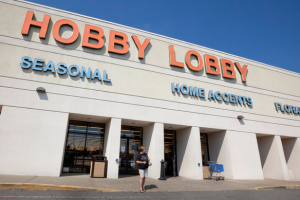In June, a federal court ruled that Hobby Lobby, the art-supply chain, could not be fined for refusing to offer its employees morning-after contraception coverage.
This challenge to the Affordable Care Act will surely go to the Supreme Court, where Hobby Lobby's lawyers will argue that a commercial company can, legally speaking, be Christian - with the same rights to religious freedom that a person has.
Hobby Lobby is not alone in identifying itself as a Christian business. Chick-fil-A, In-N-Out Burger, the trucking company Covenant Transport, and the clothing store Forever 21 all call or market themselves as Christian or faith-based, according to The New York Times.
Steve Green, the president of Hobby Lobby and a Southern Baptist, said the Christian identity of his company affects how it negotiates with vendors.
"We'll negotiate as, 'Here's what we'll pay,' and leave it at that," Mr. Green said. "Sometimes you don't intend on paying more, but they come back, and things do change. ... But we're not going to intentionally lie in our negotiating."
But what does that mean? To promote a conservative agenda? To insist on certain music in their stores or to print Bible verses on their wrappers? What about bigger questions, like how management treats - and how much it pays - its workers?
Most Christian-identified businesses were founded by evangelical Protestants who are mostly politically and socially conservative. (The well-known Roman Catholic businessman Tom Monaghan, who founded and then sold Domino's Pizza, also finances conservative causes.)
Chick-fil-A is well known for its gifts to gay-conversion ministries, but it also supports group foster homes. Tyson Foods, which was founded by evangelicals and, according to its website, seeks to "honor God," offers chaplaincy services to employees, reports The New York Times.
Earlier this month, ever-liberal Seattle media reported Chick-fil-A is on its way to that market.
It was met with skepticism, including from the Seattle Post-Intelligencer.
"The sometimes-loathed fast food purveyor Chick-fil-A is coming to Seattle," the Seattle PI reported. "The Georgia-based chicken chain is currently best known for donating millions of dollars to anti-gay groups. Chick-fil-A may have landed in hot water after its CEO remarked in 2012 that proponents of gay marriage are 'inviting God's judgment,' but the chain has steadily expanded into Western Washington all year."
With eateries in the works in Tacoma and Lynnwood, the company has now filed a permit application to build a Chick-fil-A on a vacant lot in Seattle's Northgate neighborhood, according to the Seattle PI.
According to the permit, Chick-fil-A plans to build a 3,600 square foot "quick service" restaurant at 11001 Roosevelt Way Northeast.
U.S. burger chain In-N-Out, founded in 1948 by Harry and Esther Snyder and still privately owned, has since at least the late 1980s, printed citations of bible passages on various pieces of packaging, according to CNN.
The verses themselves are not explicitly printed out, but rather text on the soft drink cup reads "John 3:16" which indicates the bible passage, "For God so loved the world, that he gave his only begotten Son, that whosoever believeth in him should not perish, but have everlasting life."



















